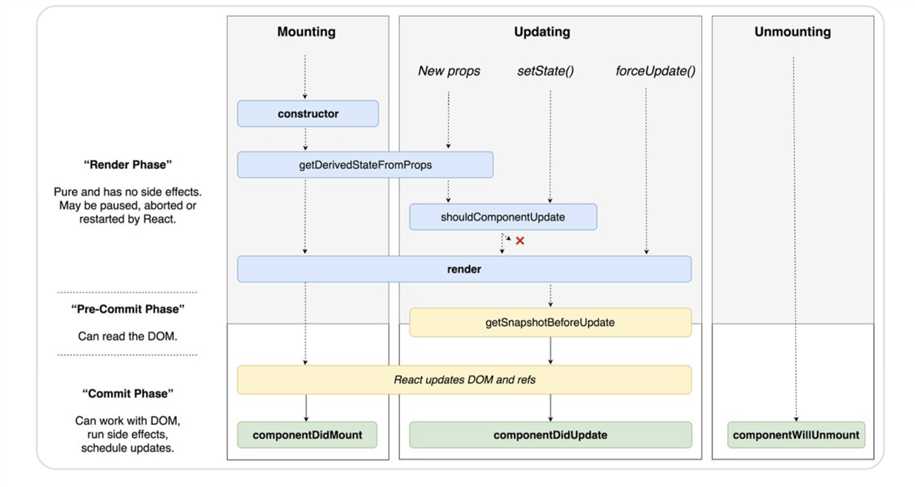a dive in react lifecycle
Posted yadiblogs
tags:
篇首语:本文由小常识网(cha138.com)小编为大家整理,主要介绍了a dive in react lifecycle相关的知识,希望对你有一定的参考价值。
背景:我在react文档里找生命周期的图,居然没有,不敢相信我是在推特上找到的。。。

正文
react v16.3 新生命周期:
- static getDerivedStateFromProps
- getSnapshotBeforeUpdata
1: getDerivedStateFromProps, 在render之前,返回一个obj更新state,或者null不更新state, 这个生命周期的使用场景是:state根据props变化。
static getDerivedStateFromProps(nextProps: SearchProps, prevState: SearchState) {
const { location } = nextProps
const state = location.state
if (state && (state.keyword !== prevState.keyword)) {
const { keyword } = statereturn {
pageState: 0,
employee: {
hit: 0,
count: 0,
data: [],
currentOffset: 0
},
document: {
hit: 0,
count: 0,
data: [],
currentOffset: 0
},
keyword,
needExact: false
}
}
return null
}
2: getSnapshotBeforeUpdata 触发时间:在实际dom挂载之前,虚拟dom构建之后。返回的任何数据或者null,都将作为componentDidUpdate()的参数。
getSnapshotBeforeUpdate(prevProps, prevState) { // Are we adding new items to the list? // Capture the scroll position so we can adjust scroll later. if (prevProps.list.length < this.props.list.length) { const list = this.listRef.current; return list.scrollHeight - list.scrollTop; } return null; } componentDidUpdate(prevProps, prevState, snapshot) { // If we have a snapshot value, we‘ve just added new items. // Adjust scroll so these new items don‘t push the old ones out of view. // (snapshot here is the value returned from getSnapshotBeforeUpdate) if (snapshot !== null) { const list = this.listRef.current; list.scrollTop = list.scrollHeight - snapshot; } }
建议用法总结请移步:https://juejin.im/post/5aca20c96fb9a028d700e1ce
这里拷贝一个我用到的一种情况:props更新时重新请求
// old componentWillReceiveProps(nextProps) { if (nextProps.id !== this.props.id) { this.setState({externalData: null}); this._loadAsyncData(nextProps.id); } } // new static getDerivedStateFromProps(nextProps, prevState) { // Store prevId in state so we can compare when props change. if (nextProps.id !== prevState.prevId) { return { externalData: null, prevId: nextProps.id, }; } // No state update necessary return null; } componentDidUpdate(prevProps, prevState) { if (this.state.externalData === null) { this._loadAsyncData(this.props.id); } }
我的使用:
componentDidUpdate(prevProps: SearchProps, prevState: SearchState) { const { keyword, needExact } = this.state if (keyword && (keyword !== prevState.keyword)) { // 上一次的state和这一次的对比,如果需要,就进行fetch数据,并setstate。其中this.state就是getDerivedStateFromProps返回的 更新后的state if (needExact) { this._fetchExactData(this.state.keyword) this.setState({ needExact: false }) } else { Promise.all([this._fetchInitData(‘document‘), this._fetchInitData(‘employee‘)]) .then(values => { let pageState = 0 const { state } = this.props.location if (state && state.type) { pageState = state.type } else if (!values[1] && values[0]) { pageState = 1 } this.setState({ pageState, }) }) } } }
最后,记录一个小知识点:
由于state变化,需要出发请求数据的,在componentDidUpdate中进行。
以上是关于a dive in react lifecycle的主要内容,如果未能解决你的问题,请参考以下文章